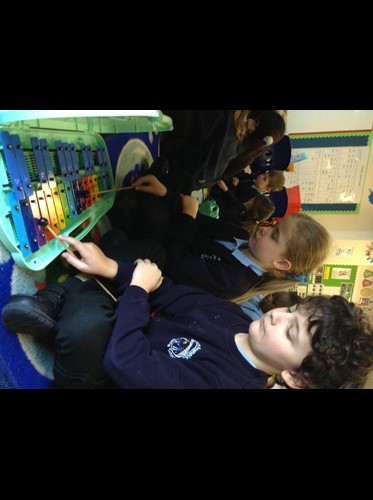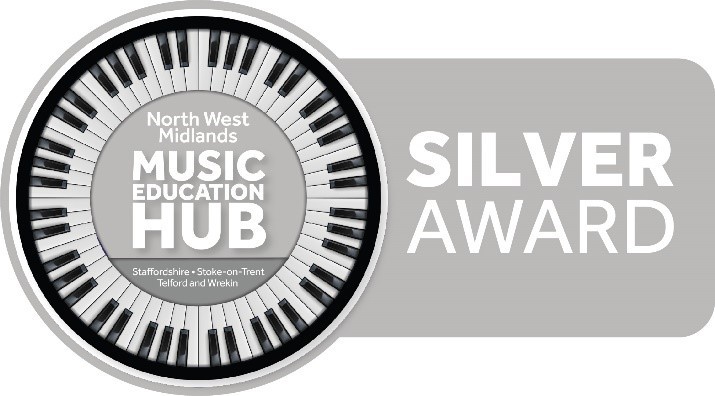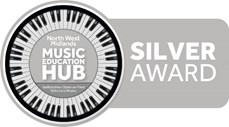Music
At William Reynolds Primary school, we recognise the importance of music to engage pupils, offering them opportunities to succeed beyond the traditional academic curriculum, stimulate their talents and spur on their academic performance, creativity and independence in order to aspire for the future.
Our principle aims – from the National Curriculum in England - for Music are to:
- Perform, listen to, review and evaluate music across a range of historical periods, genres, styles and traditions, including the works of the great composers and musicians.
- Learn to sing and use their voices, to create and compose music on their own and with others, have the opportunity to learn a musical instrument and use technology appropriately.
- To understand and explore how music is created, produced and communicated, including through the inter-related dimensions: pitch, duration, dynamics, tempo, timbre, texture, structure and appropriate musical notations.

A broad and balanced creatively driven music curriculum, helps our pupils to develop a creative flair and imagination and gives pupils a better understanding and knowledge of cultural capital.
The core of our Music curriculum is the National Curriculum for England which is supported by the DfE Model Music Curriculum: Key Stage 1 to 2 (March 2021) and the Government endorsed Telford & Wrekin music service.
The Ofsted research review for music (July 2021), explained that the value of the music industry to the UK economy was £5.8billion in 2019. With this in mind, we create a passion for music in our children that will open opportunities in the future should they wish to pursue a music career.
The curriculum has been specifically sequenced in a logical progression to ensure that new knowledge and skills build on what has been taught before: Early Years to Year 6. This enables our pupils to know more and remember more. End points and target points within objectives are identified for each year group through a whole school music progression plan. The sequence develops pupils’ musical knowledge and competencies over time; we use the basis of the 3 Pillars (technical, constructive and expressive) to aid progression in performing, composing and listening. Technical understanding is gained by playing instruments and singing, translating their intentions successfully into sound. Constructive understanding is covered through knowing musical components and how they can be put together, and expressive understanding is developed by discovering the quality, meaning and creativity in music. These enable the pupils to gain a sound musical understanding.
All pupils access at least 30 minutes per week of taught music where they are given opportunities to play a tuned or un-tuned instrument as well as singing throughout the year. Singing is a strength of the school due to fluency in reading enabling them to perform with confidence.
Every year group has a yearly Curriculum Map that outlines the key areas of music which will be taught throughout the year. This ensures that an adequate amount of time and coverage is allocated to each key area.
Telford and Wrekin music service plan and deliver a sequence of progressive weekly lessons and over time, giving the children time to master new concepts. Within their planning, key objectives and vocabulary are outlined.
Where possible, lessons are contextualised to engage the children further with their learning. As a school we understand the importance of high-quality teaching so employ music specialists to deliver the curriculum. This is also used as an opportunity to upskill teachers through regular CPD.
Within the lesson, teachers check pupils understanding effectively and address any misconceptions through regular feedback. The curriculum is designed and delivered in a way that allows pupils to know more and remember more. Key skills and knowledge are embedded in their long-term memory so they can apply them across a variety of instruments and singing.
The EYFS curriculum includes rich opportunities for pupils to encounter the joy of music through singing and playing. Within the Foundation Stage, pupils can experiment with musical instruments and sing on the performing arts stage. Musical instruments are also available in the outdoor environment. Pupils sing and perform a range of well-known nursery rhymes and songs whilst learning how to move in time with music.
As pupils move through KS1, they will be taught musicianship (pulse, beat, rhythm & pitch) by a subject specialist whilst further progressing skills in singing, listening and composing. When focussing on composing, children use graphic notation to represent created sounds. Year 2, use graphic symbols, dot notation and stick notation and apply these skills when learning to play a tuned instrument.
Key skills and techniques learnt in KS1 are built upon in KS2 with singing remaining a key thread throughout. Pupil’s access and make progress with a musical instrument through whole class tuition – recorder (10 weeks), ukulele (31 weeks) & doots and toots (20 weeks). In KS2, a specialist music teacher is employed to teach more technical music lessons such as composing, reading and writing notation and performing.
The impact of our curriculum is that:
- Pupils make progress playing tuned and untuned instruments.
- Pupils know a range of music genres, styles & traditions.
- Pupils sing a broad range of songs as a choir in school assemblies, school performance opportunities and to a wider audience.
- Pupils understand how music is created, produced and communicated, including through the inter-related dimensions: pitch, duration, dynamics, tempo, timbre, texture, structure and appropriate musical notations.







